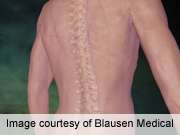Model can predict spine surgery complications

(HealthDay)—A new model can predict the risk of medical complications, including major complications, after spine surgery, according to a study published in the Feb. 1 issue of The Spine Journal.
Michael J. Lee, M.D., from the University of Washington in Seattle, and colleagues created and validated a predictive model for the risk of medical complication or major medical complication during and after spine surgery using a prospective surgical spine registry. Demographic, comorbidity, surgical, and complication details recorded for two years after surgery were evaluated in 1,476 patients. Data were split into two groups for internal and cross-validation.
The researchers found that the final predictive model for any medical complications had a receiver operator curve characteristic of 0.76, which is considered to be a fair measure. The final predictive model for any major medical complications had a receiver operator curve characteristic of 0.81, which is considered to be a good measure.
"The value in this model is that it gives the user an absolute percent likelihood of complication after spine surgery based on the patient's comorbidity profile and invasiveness of surgery," the authors write.
Several authors disclosed financial ties to the medical device industry.
More information:
Abstract
Full Text (subscription or payment may be required)
Copyright © 2014 HealthDay. All rights reserved.




















